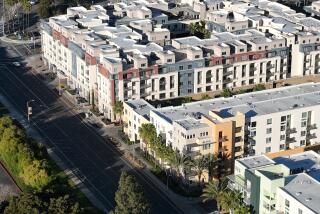Lawndale Seeks Way to Issue Building Permits : Development: Lacking a valid General Plan, the city will ask the state to approve a temporary permit process that will allow it to approve construction under current building and zoning standards.
- Share via
The city of Lawndale will ask the state to approve an interim process that will allow it to issue building permits for new developments although it lacks a valid General Plan.
The city stopped issuing building permits last week when voters overwhelmingly rejected three ballot measures intended to end a controversy over the General Plan, which governs all zoning and development in the city.
The effect of the vote was to invalidate the city’s 1976 General Plan and prohibit the council from enacting a new one without voter approval. State law requires cities to have an up-to-date General Plan before building permits can be issued.
After reviewing the situation for two days, city officials Friday relaxed the freeze slightly by allowing permits for room additions, minor repairs, and the installation of appliances essential to health and safety, such as water heaters and gas furnaces.
Then Monday, as part of a five-point recommendation by City Atty. David J. Aleshire, the City Council in an emergency meeting voted 3 to 2 to ask the state Office of Planning and Research to approve a temporary permit process that will allow the city to approve construction under current building and zoning standards. That process would give the city time to approve a new General Plan.
Aleshire said that the interim process, which could be extended for two one-year periods, may be approved by the state in about 60 days.
In the meantime, the council approved the issuing of building permits to developers who promise to assume all losses should the permit be found invalid and agree to pay the city’s legal costs should Lawndale be sued for issuing a permit without a valid General Plan.
Aleshire said the city can continue to issue permits for minor additions and repairs without waiting for interim approval, because permits for such work will not increase density, thus complicating the writing of a new General Plan.
At Monday night’s meeting, Mayor Sarann Kruse, Councilman Dan McKenzie and Councilwoman Carol Norman voted in favor of Aleshire’s recommendations. Councilmen Harold Hofmann and Larry Rudolph rejected the recommendations, saying they oppose requiring developers to assume liability for immediately resuming construction.
City Manager Jim Arnold said he does not know how many projects have been delayed but noted that the Planning Commission has put off for two weeks decisions on eight major developments.
The city staff already has begun drafting a new General Plan, which should be completed in nine to 15 months, Arnold said. Afterward, it will go to voters for approval.
About 30 residents, developers and contractors attended Monday’s meeting, generally blasting the council for failing to foresee and prevent the problem.
Frank Sabatasso, a Lawndale developer whose permit to build a 14-unit condominium project on Larch Avenue was held up, asked Aleshire if he could guarantee that the state will approve the interim process.
Aleshire said he could give no such assurance but thought that the agency will “most likely” approve the process.
Sabatasso said he will wait for state approval before seeking a permit for his project.
However, Oscar Robison, a builder from El Segundo who wants to construct an 18-unit apartment project on 147th Street, said after the meeting that he cannot wait 60 days to get a permit.
He said he plans to sign the liability waiver. “I’m just going to take my chances,” he said. “I have no choice.”
Steve Mino, one of the five city activists who wrote and signed the ballot arguments against the measures, blamed the council for the development crisis.
“The only reason you are in the mess is because you didn’t want the people to vote on a General Plan,” he told the council, comparing it to a stubborn mule that will only move when it is hit with a thick board.
“I hope we have your attention,” he told the council.
The city’s development dilemma can be traced to 1963, when the council approved an ordinance--sought by initiative petitions--that required voter approval of the General Plan. In 1974, the state attorney general said the measure, which is called Ordinance 82, could be ignored because it is unconstitutional. As a result, the council adopted the current General Plan in 1976 without voter approval. However, last December the attorney general’s office reviewed the earlier opinion and said it was erroneous.
The reversal raised the question of whether Lawndale has a valid General Plan, because it was not adopted by the electorate as required by Ordinance 82.
In April, the City Council ordered Aleshire to draft three ballot measures to resolve once and for all the confusion over Ordinance 82. But it seemed no one was prepared when all three measures were rejected.
More to Read
Sign up for Essential California
The most important California stories and recommendations in your inbox every morning.
You may occasionally receive promotional content from the Los Angeles Times.











